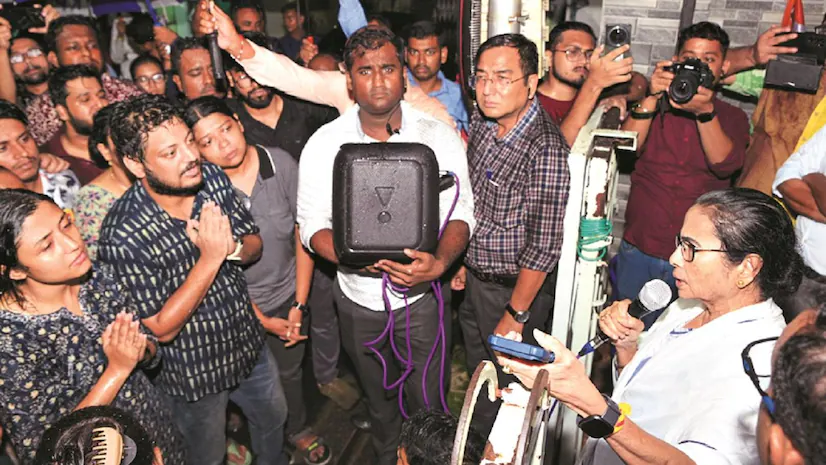West Bengal CM’s call for Death Penalty for Rapists is Politics of Revenge! A step backwards for Human Rights!

By PUCL NATIONAL
PUCL condemns the proposal by the Mamata Banerjee government to amend the law to provide for death penalty for convicted rapists.
The PUCL is of the concerted opinion that this is a cynical and politically motivated attempt by Mamata Banerjee to deflect attention from the negligence and criminal culpability of her government in the rape and murder of the 31-year-old trainee medic while she was on duty at Kolkata’s state-run RG Kar Medical College and Hospital. Instead of taking concrete steps to ensure the security of women doctors and ensure that there is a fair investigation into the heinous incident, the Government has instead gone for this headline grabbing move rife with serious implications for human rights.
The unserious nature of the proposals of the West Bengal government are also apparent from the absurd proposals surrounding fast track courts (without sustained reform of judicial system), completion of trial in 7 days and even encounter killing of rape accused! These proposed reforms take away from the constitutional imperative of respecting due process rights and fair investigation, without in any sense helping the cause of justice for the victim.
In 2013, in our country, in the light of the brutal rape and murder of the young woman referred to as ‘Nirbhaya’, the Verma Committee went into the question of the death penalty as punishment for rape. The Committee concluded that, ‘having regard to the current thinking in favour of abolition of the death penalty, and also to avoid the argument of any sentencing arbitrariness, we are not inclined to recommend the death penalty.’ The Committee also forcefully argued that ‘it would be a regressive step to introduce death penalty for rape even where such punishment is restricted to the rarest of rare cases. It is also stated that there is considerable evidence that the deterrent effect of death penalty on serious crimes is actually a myth.’
There is also little empirical justification for the proposition that the death penalty for rape has resulted in deterrence of the crime of rape. The justification of the death penalty is only retributive with the inherent ancient logic that a criminal needs to be punished in the form of ‘an eye for an eye and a tooth for a tooth.’ Retribution is at heart the baying for blood of the mob , which is recognised in the logic of the law. As people concerned about human rights, we need to remember that the retributive logic of punishment is not the logic of justice but revenge. Any decent society needs to shun the politics of revenge.
When the politics of revenge extends to the judicial taking of life, then very little distinguishes the murderer from the state which murders. The death penalty in its finality, leaves no space for reformation and change which should be the very logic of punishment. As Justice Stewart noted in Furman v. Georgia, “The penalty of death differs from all other forms of criminal punishment, not in degree, but in kind. It is unique in its total irrevocability. It is unique in its rejection of rehabilitation of the convict as a basic purpose of criminal justice. And it is unique, finally, in its absolute renunciation of all that is embodied in our concept of humanity.”
For the Indian scenario, it is important to understand that the issue of the effectiveness of the proposed solution for the problem of rape has been disputed by a range of empirical studies. If death penalty is the only punishment for rape, judges may well be less willing to convict, resulting in more acquittals. It is the question of acquittals which has to be seriously studied and the Government must put its resources behind ensuring fool proof investigation and a competent prosecution rather than go for a measure which will do little to make the workplace more safe for women.
The world is increasingly recognising the serious human rights implications of the death penalty with abolition of the death penalty becoming the policy choice of most countries. In fact, 78% of the world’s countries have abolished it as a form of punishment. Of which 109 countries have completely abolished it. 10 countries have it under exceptional circumstance, 23 have not had any execution for the last years as a matter of policy and 53 countries still have the death penalty, which include, Iran, China and the USA, none of which are models which it come to the practice of human rights.
By proposing the reinstatement of the death penalty, the Mamta Banerjee government is taking a step backward as far as human rights in India is concerned.
We demand that the West Bengal Government address the pressing injustice done to the trainee doctor and take measures to make the life of other trainee doctors more safe, instead of compounding its criminal irresponsibility through introducing the death penalty.
Kavita Srivastava, President
V. Suresh, National General Secretary
Binayak Sen, Vice President, PUCL – West Bengal
Amlan Bhattacharjee, Coordinator – West Bengal Unit